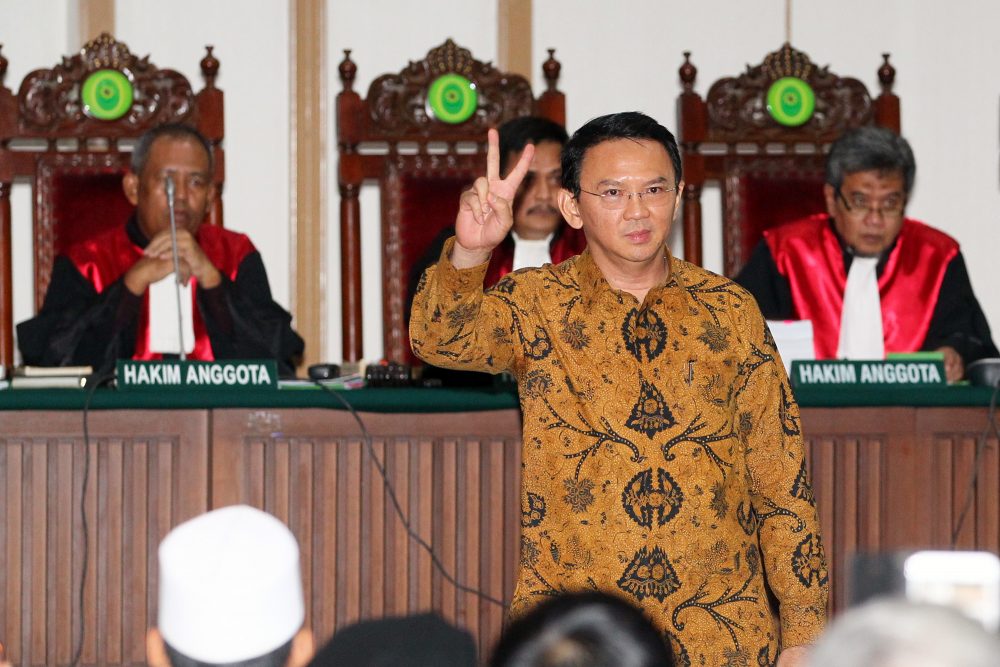
Unsurprisingly, such assertion is rendered moot in the face of actual statistics happening on the ground. The increasing use of the anti-blasphemy law from 2004 to 2014 as referenced from all the publicly available blasphemy cases from Indonesian courts (one case in 2004, 10 in 2012, and 11 in 2014) is not accompanied by the decrease of religious violence.
In fact, according to data from the National Violence Monitoring System (NVMS), there has actually been a constantly upward trend of inter- and intra-religious conflict from 2004 to 2014 (four cases in 2004, 101 in 2011, and 257 in 2014). At best, this implies that there is no effect of the existence of the anti-blasphemy law towards its initial attempt to decrease religious violence. At worst, this implies that there might be positively correlating effects.
Qualitatively scrutinizing the use and cases of the anti-blasphemy law, the latter appears to be hauntingly true. There are two ways in which the anti-blasphemy law positively affects the increase of religious violence and intolerance.
First of which is from the pervasive and divisive social discourse of what is blasphemous that arises during the span of these accusations and trials. It needs to be understood that most of the time, those who initially file blasphemy cases is a small number of people coming from a niche hard-lined interpretation of religion; it is rare to see that the initial filing of these blasphemy cases coming from a collective (i.e. a whole village community). It is only after the initial case is filed that the number increases.
This is because, due to the vagueness of the law’s definition on what is blasphemous, the definition of what is blasphemous is usually left up to religious state bodies and organizations like the Indonesian Ulama Council (MUI), whose members usually are the ones that file the case to begin with.
Through demonstrations and door-to-door mobilizations in the span of the trial, this definition is pervasively exposed towards the once tolerant society; and not in an egalitarian way where there is a fair and reasonable discourse amongst society on what is blasphemous, but in a hierarchical way where the bodies unilaterally impose the belief that the action is blasphemous society are left to merely accept and internalize. In effect, the law provides a platform for these divisive interpretation to spread from a small niche of people, to many.
The recent case involving Jakarta Governor Basuki Tjahaja Purnama (Ahok) is a vivid example of this effect. Prior to Islamic Defender’s Front’s (FPI) filing of Ahok’s statement in Kepulauan Seribu as blasphemous, no one bat an eye to what he said. Most either ignored it or believed that it was not significant enough to incite them to protest. It was only after the filing that MUI gave out the fatwa and FPI had the platform to dictate without contest, that what Ahok said was blasphemous did people begin to perceive it to be. Regardless of the decision, the trial in itself have had people shifting to a more intolerant state.
The second way in which the law positively affect the increase of violence and intolerance is by giving masses the incentive to conduct socially disrupting activities to begin with. It is now worth reiterating that one of the main reason that this law was upheld to begin with is to prevent social disruption; that if ever there is a case in which a blasphemous act creates a certain level of disruption in society, that act need to be punished to prevent the continuance of violence. It is this exact rationale of the law that leads to the increase of violence.
The loophole in this logic is that it gives incentive for religious organizations to increase disruptive acts in the attempt to link the blasphemous act towards an increased social unrest, and ultimately jail them; if nobody protested and/or are angry, then there would be no need for the court to indict.
Empirically, this tactic is mostly successful. Out of 13 accessible court decisions, 10 of them noted that what strengthens the decisions to indict is that the act of the “perpetrator” has “disrupted the social harmony” of a certain community. This happens in big cases, such as the case in Sampang with the burning of Shia houses and the case of Atheist Minang with the perpetrator being hit and threatened by mobs, as much as it did in small cases, such as the case of Guru Bantil in East Kalimantan and the more recent Abraham Millata sect in Aceh.
What people seem to forget, is that with the decision of the Supreme Court in 2010 to maintain Indonesia’s blasphemy law came also the chance to revise it. The Supreme Court in the decision also ruled that the law needs “perfecting” by the House of Representatives, and surely perfecting is what it needs.
Whatever the result, be it small tweak in words, complete changes of sentence, or a motion to scrap it altogether, there needs to be more scrutiny given by society and politicians alike towards this law. Because as one can see, it definitely is not the solution to violence, and worse yet, it might actually be a source.

